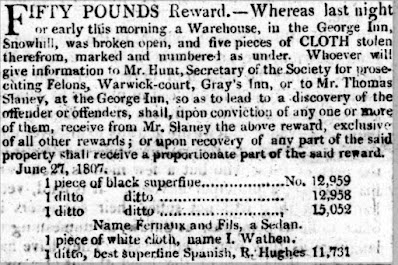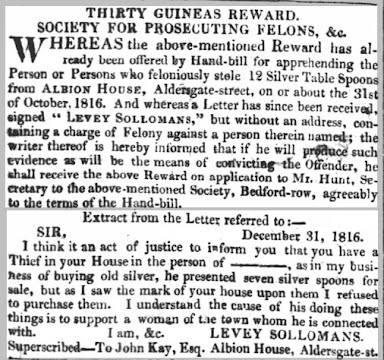I discovered an interesting fact last week, one that I should probably have known about before now.
In Regency England, if you were assaulted, robbed, or otherwise the victim of a criminal act, you had to pursue prosecution yourself and pay for all the fees and costs of such prosecution. There were no public police to bring charges, and so the responsibility lay with the injured.
To deal with the costs incurred with such prosecution, there were set up voluntary societies or clubs, where an annual or monthly fee payment ensured reimbursement of expenses. Such a group was the Society for Prosecuting Felons:
The above advertisement was published in the Commercial Directory for 1818-20. But the Society had been around for quite some time. Below is another advertisement for the Society from the Reading Mercury - Monday 27 April 1801:
Often the societies paid rewards for information and assistance as well as covering legal and other expenses as the advertisement below from the Morning Advertiser - Monday 29 June 1807 indicates:
Often the societies paid rewards for information and assistance as well as covering legal and other expenses as the advertisement below from the Morning Advertiser - Monday 29 June 1807 indicates:
And this notice below from the Public Ledger and Daily Advertiser - Wednesday 08 January 1817
Monthly meetings were held to discuss the various business aspects, noted below from the Oracle and the Daily Advertiser - Tuesday 18 February 1806 :
As these groups had grown out of parish council support for prosecution fees, it was logical that they continued to have parish connections.
Rastrick Society © Calderdale MBC
Any worthwhile society had of course to have its annual dinners and annual meetings:
from Sun (London) - Monday 06 June 1803
from Sussex Advertiser - Monday 01 February 1819
The Regency era was over before full responsibility for prosecution of criminals--and proper defense of the accused--lay with the government and employees hired for the job, including police forces.
Until then the societies for prosecution were useful tools for those who had been injured and/or wronged.
'Til next time,
Lesley-Anne








1 comment:
Great stuff, Lesley-Anne!
Joanna Waugh
Post a Comment